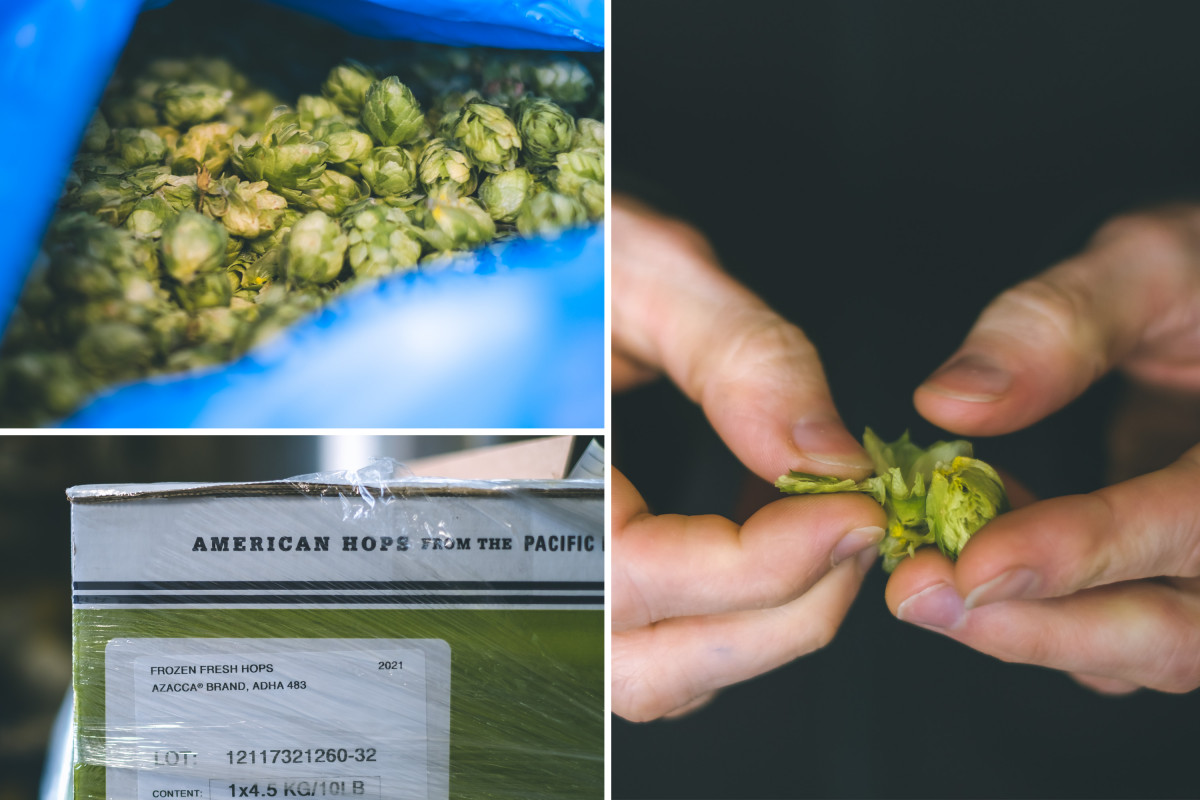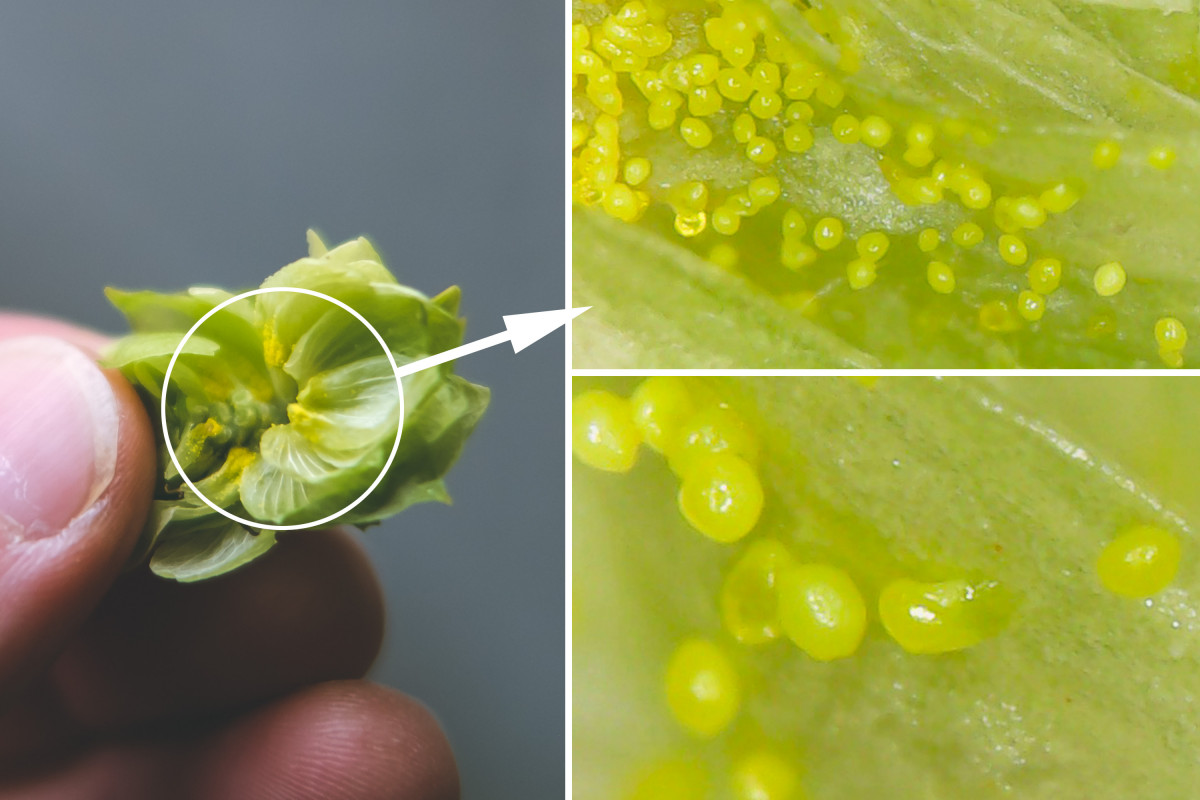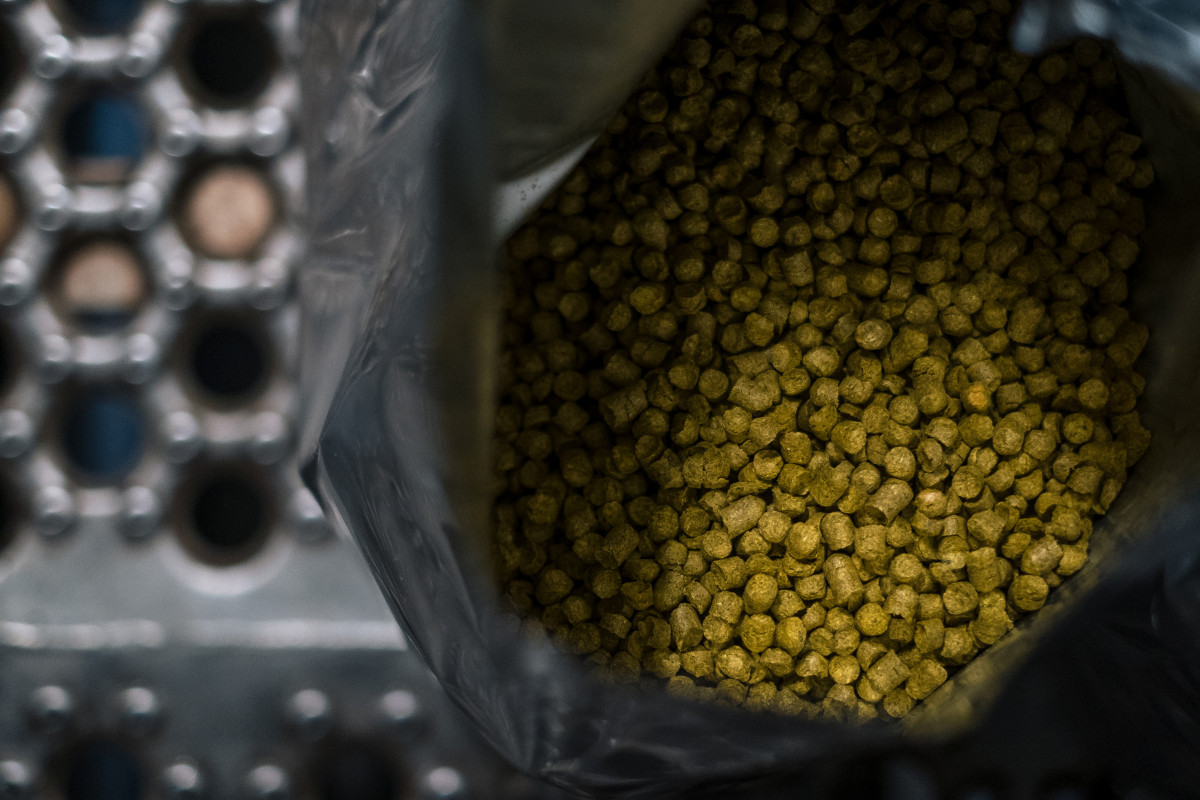What are hops?
Let’s begin at the beginning. Hops are the flowers of the hop plant (Humulus lupulus). They are a key ingredient in brewing beer, providing us with bitterness, aroma, and flavour. They also have preservative properties, which has influenced beer as we know it today. It’s fair to say that our brewery wouldn’t exist without hops!

While traditionally hops are used in their whole-leaf form, hop pellets (or T90) are the most common form of hops used in brewing today. They’re made by grinding whole hop cones into a fine powder and compressing them into small, cylindrical pellets. This process preserves the essential oils and alpha acids, which are responsible for bitterness, flavour, and aroma in beer, while also keeping some plant matter intact. As the image below shows, all the hop flavour comes from the Lupolin, the yellow powerdery looking part.

We can add hop pellets at different stages—early in the boil for bitterness and base flavour, late for punchy aroma and flavour, or during/post fermentation (known as dry-hopping) for fresh bursts of aroma before packaging.
What are advanced hop products?
Advanced hop products come in many shapes, sizes and quirky brand names, but at their core help brewers with one or both of only two things: adding bitterness, or adding flavour and aroma.
The first patents for advanced hop products date back to the 1970’s, so while these products might feel new, their development has been going on over the past 50 years!
The new science-driven innovations can assist by elevating the impact of a beer’s hop profile, achieving the desired results with more efficiencies, or adding different dynamics to a beer that wouldn’t otherwise be possible. Often there are additional benefits to these products, as they tend to be concentrated liquids, and therefore lighter in weight. This can make them easier to ship, store and even practically add to the beer itself.
When we talk about efficiencies, this can broadly be broken down into two sections. Firstly, concentrated hop products in theory require less quantity for the same level of impact. Secondly, with less ‘plant matter’ in a beer, this should result in less wastage and therefore greater yields.
What kind of advanced hop products are there?
So far, so good. But now it begins to get more technical. Here’s a breakdown, as succinct as we can make it, of the different types of advanced hop products available. Our ‘futuristic’ 12th anniversary beer Persistence of Time is a showcase of modern hop products, so we reference it throughout.
Alpha Acids / Bitterness
These products help brewers to achieve the clean bitterness they’re looking for. Examples you might hear about include:
Isomerized Kettle extract (IKE) - for better bittering utilisation in the kettle.
Aqueous Isomerized alpha acids (ISO) - these give brewers the chance to add hop bitterness later in the process, post-fermentation
Reduced Isomerised alpha acids (RHO) - light stable, so can actually used by breweries to prevent ‘skunking’ aroma when using clear bottles
Tetrahydro iso-alpha acids (Tetra) - similar to RHO but can also be used to aid with the foam of a beer
Needless to say, this is not all of them!
Enriched Pellets
Our standard hop pellets are ‘T90’ - this means that roughly 90% of the pellet is made up of ‘green matter’ of the hop cone, with 10% therefore hop oils.

If you’ve ever heard of products like Cryo® or Lupomax®, the ratio changes to around 45% green matter vs a more intensely flavoured 55% oils, separated in extremely clever processes at extremely cold temperatures.
Persistence of Time features Citra Incognito® and Krush Cryo®. Taking this idea one step further, we’ve featured an additional product called Super Sauvin. These are standard pellets, infused with Phantasm®, a patented natural Thiol precursor product extracted from Marlborough Sauvignon Blanc grapes. The ‘Thiol precursors’ give us high potential for biotransformation, the biological process that creates complex, bang-for-your-buck flavoursome hop aroma.
Liquid Hop Products
This category is probably the most synonymous with ‘advanced hop products’ as you know them. These flowable hops are made up of concentrated hop oils and alpha and beta acids. This gives us the concentrated hop flavour without vegetative material and profiles true to the original hop. We also maintain some resinous character with these products.
Examples of these that you may have heard about are Incognito®, Dynaboost® and Spectrum® and the products are typically used in the whirlpool.
Persistence of Time uses Citra Dynaboost® in a ‘Hop Dip’ - where a proportion of wort is blended with concentrated, warm ‘hop tea’ in a separate vessel, before the rest of the chilled wort is added and yeast can be pitched. This is one of many methods to build layers of flavour, and is known for pushing fruit character as opposed to earthiness or grassiness.
Hop Oil Products
Hop oils capture the pure essence of aroma, amplifying citrus, pine, or tropical fruit notes in beer. These products are all about flavour, with minimal green matter and no bitterness present at all. This area of advanced hop products is where much of the innovation is sitting in 2025. The products are typically made into emulsions, which enables them to be soluble in beer. They’re typically added during active fermentations for a true-to-type representation of the hop. They tend to enjoy the later stages, warmer environments and require agitation to ensure they fully blend into the beer.
Examples of these that you might have heard mentioned include Abstrax Quantum®, Hopkief® and Hyperboost®. Persistence of Time utilised Krush Hyperboost® as a late addition.
Terpenes
Although this could be bracketed into Hop Oils, it’s useful to separate out as terpenes are looking to achieve something quite unique. While the Oils listed above are made directly from other forms of existing hops exactly as they are, it’s possible to break down the make up of various oils from various hops, in order to isolate the specific terpene profile that you desire.
Terpenes are natural aromatic compounds found in plants, including hops, that contribute to their flavor, aroma, and even some potential effects on taste perception. They’re responsible for the citrus, pine, floral, and fruity notes in hops, making them a key player in beer’s aroma and flavour profile.

Hops are not the only place that you find terpenes, nor are they the most famous. It’s actually Cannabis where terpenes can be particularly intense. In Persistence of Time, we use a product called Abstrax Brewgas®, which presents the terpene profile of Pineapple Express and King Louis cannabis strains! Incidentally, these products contain zero THC or CBD - which you may be pleased to hear, or not.
Cool, but why does it matter?
It’s clear that brewers can find benefits in flavour, aroma and in their efficiencies. But why should you care? Is this interesting? And/or what do you, as a beer consumer, get from it?
For beer lovers, this kind of innovation could lead to a better standard of beer available to you. Whether that’s bigger flavour, bolder aroma or more of the ‘hop hit’ that you’re looking for.
In the brewing world right now, one thing most people agree with is that using these products presents less variables than cone or pellet hops, and therefore should give you a more consistent drinking experience - pint after pint.
Brewers can ‘fine-tune’ their beers, from the exact bitterness of a crisp pilsner to the tropical explosion of a NEIPA. Plus, these products could help us to reduce waste and make brewing more sustainable, both financially and environmentally.

On the counter argument, you might ask at what point do these products change the dynamic of what hops are, how beers get their flavour, and how this sits in the tradition of the greatest drink in the world.
In our testing at Siren, we’re always ‘blind tasting’ any trials. The beer’s overall profile will come before any secondary benefits.
One thing we know from our own testing, is that as things stand, they will always be additional ‘boosters’ rather than ‘replacements’ for the hops we know and love. The breadth of flavour is absolutely critical, and we’re yet to try a liquid form hop that can provide that.
But the advancements in the past ten years or so are truly incredible. Expect to hear more from us about experimentation and innovation in months to come.
—---------------
What did you think of ‘Persistence of Time’? Let us know your thoughts on siren@sirencraftbrew.com. And if you’re enjoying our long-form blog content, please let us know, so we can make time for more of it!
—---------------
Further reading

